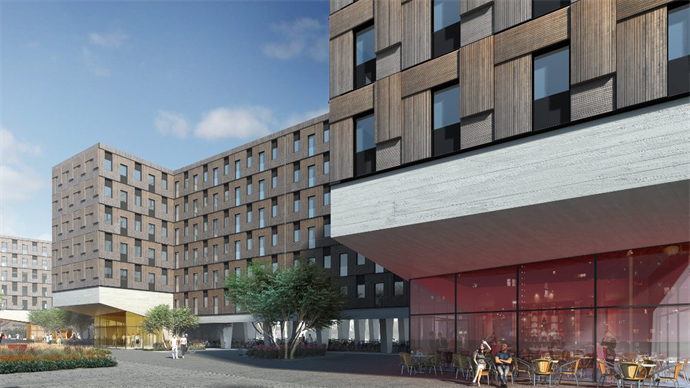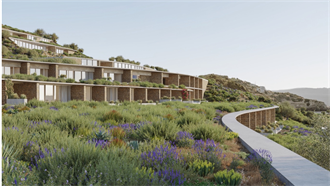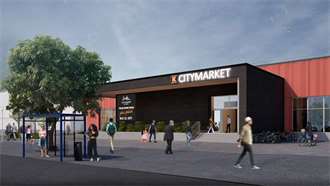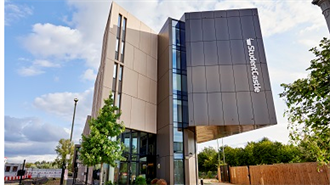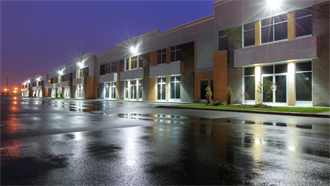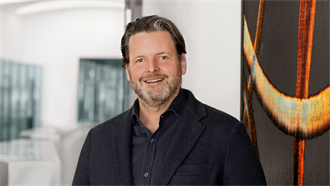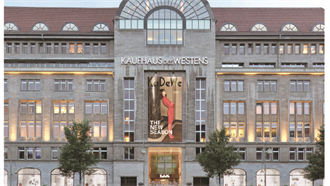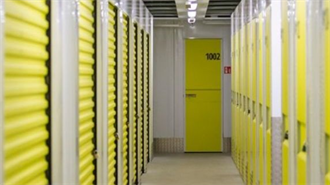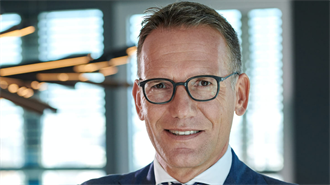One of Europe’s largest real estate managers has teamed up with a German modular timber construction company in a planet-friendly approach to providing more living and working space in constrained markets.
Nobody can say for sure when transformative approaches to real estate investing began, or where they will all end.
Yet it is certain that some companies are presently in the middle of new approaches to construction, development and asset management that are wanted by investors, and moreover, needed by a planet challenged by man-made CO2 emissions of which real estate is said to contribute 36% in the EU.
Modern CEOs of European real estate companies recognise it is no longer enough to make profits from property on behalf of investors and shareholders. Income and profits must now derive from activities that are closer to carbon-neutral to prevent further environmental damage. Ideally, real estate investing should also have a positive social impact value.
Lars Schnidrig, CEO of Corestate Capital Group, is one of those at the forefront of this mindset, who argues that just writing something down on paper is worthless if not accompanied by action.
In June 2019, the public property company – one of the largest in Europe – published its first ESG report and set firm sustainability goals; it adopted an extensive catalogue of ESG objectives; it is taking action to reduce CO2 emissions by at least 20% across its portfolio, and relaunched its website with a digital sustainability report.
‘We have committed ourselves to reducing CO2 emissions per square metre in our assets under management of over €28 bn by at least 20% over the next five years – the same applies to water and waste consumption,’ said Schnidrig. ‘We even want to increase energy efficiency by 30%. In doing so, we are making an important contribution to combating climate change.’
PropertyEU caught up with Schnidrig in February to hear of initiatives under way or completed that show the way in which some real estate companies are transforming themselves and, by proxy, the industry.
The conversation took place just a few days after Schnidrig was starkly reminded yet again of the unpopularity of real estate companies among sections of society not only rallying against environment damage but also among those who cannot afford rent increases. German police had to restrain protestors outside a Berlin real estate congress he attended where up to 400 participants had gathered.
Echo in Munich
So, what is Corestate doing to demonstrate its credentials as a transformative real estate firm?
A sign can be found at the value-add project ‘Echo in Munich’, located 8 km from the city centre where the company has teamed up with The Boxx Solution, a German firm specialising in carbon-neutral prefabricated timber modules that can be completed in a sustainable, time-saving way.
At this project, fully furnished modules made off site by The Boxx Solution are being placed on the roof of an underground car park. It will function as a Montessori school, which has signed a lease for the space.
Corestate believes there are several advantages to using this prefab timber module solution: less noise pollution, quicker construction, and less CO2 production are obvious ones.
The cross-laminated timber comes from a local factory in Bavaria and is sourced from a regional woodland that uses sustainable forestry principles and immediate reforestation techniques. By using the modular approach, construction time can be shortened by up to 50% and building costs are estimated to be up to 30% lower.
All of the load-bearing components in these modules can be made of wood. As timber stores CO2 rather than producing it like steel and concrete, it is carbon-neutral.
Wood building city
In Munich, timber construction is a growing trend and the city has declared it wants to become leading wood building city internationally. Munich is planning the largest coherent wooden construction settlement with around 570 flats in Germany.
It is little surprise therefore that the city gave fast approval for its plan to create a modular timber school building at the Echo project.
The energy consumption of project Echo in Munich meets the KfW-55 energy standard (KfW stands for Kreditanstalt für Wiederaufbau, the German state-owned Bank of Reconstruction which manages two programmes to improve the energy efficiency of German residential properties) but it will move closer to around KfW-45 as the building’s energy consumption falls.
Schnidrig emphasised the other advantage is that because the timber modules are lighter than concrete, they can be placed on the top of existing buildings. He and Corestate are big believers in ‘redensification of cities’, and where there is no more land for new buildings, adding storeys in this way to existing buildings can be the answer.
ESG demands
In Dresden, Corestate has another project where it envisages 360 serviced apartments and co-living units. In this case, the building ground is the roof of a shopping centre! But that is no problem. Timber modules can be placed on the rooftop without fear of it caving in due to their limited weight.
Schnidrig said modular timber construction is an innovative answer to the rising demand for ESG-compliant solutions and urbanisation – two key trends the whole property industry is facing. ‘This innovative new building concept perfectly ties into our ESG strategy and answers the challenge of urbanisation. As we had recognised increasing investor demand for ESG-compliant products very early on, we are now able to satisfy this demand as first mover, providing very customisable sustainable investment products.´
Tackling problems
Lars Schnidrig, CEO of Corestate Capital Group, says the company is ‘looking for answers to bring equilibrium’ to property investing amid growing climate concerns and the public backlash against issues such as rent rises. Though he agrees with those who say Berlin’s new rent freeze and cap regulation is not the answer, he understands the strength of feeling among those that cannot afford rents amid a chronic shortfall of small living space in some German cities.
Schnidrig believes the solution is best tackled by local authorities and real estate firms collaborating and by enabling speedier planning outcomes, as they have managed to do in Munich. No longer do people want the 1960s huge apartment blocks where thousands of people share only in loneliness and boredom, he adds. Instead, Corestate is creating living quarters. ‘These are the chances for flagship developers in this industry and it is what we are doing,’ he says.
25,000 energy bills uploaded
Corestate Capital has an ESG team that has uploaded more than 25,000 energy bills to calculate how much energy is consumed at each asset within its enormous portfolio. To produce the data, the firm has linked up with tech company Measurabl which describes itself as the ‘world’s most widely adopted ESG data management platform’ for commercial and multi-building tenants.
Measurabl was founded by Matt Ellis, a former CBRE broker who went on to lead the service company’s sustainability practice group in the western US. Once the process of uploading bills has been completed, the data can become fully digitalised and integrated across a portfolio allowing Corestate Capital to measure and benchmark energy use and CO2 emissions at its buildings, and track improvement strategies. This helps Corestate Capital answer questions from investor-clients about GRESB ratings.
It will also become critical from a regulatory standpoint: in Germany, for example, there is to be a cost for CO2 emissions from buildings starting from 2021. The German government has yet to specify if there will be a punishment for owners and managers that cannot measure CO2 emissions, but it looks like there will be no choice for real estate investment firms other than to comply.
Densification strategy
Corestate strongly supports the idea of redensifying cities by adding storeys to existing assets with sustainable wood modules where there is no more land for new buildings,. In order to do this across the portfolio, it embarked on a large-scale exercise to assess opportunities on an asset-by-asset basis involving a significant cost by hiring architects and engineers specialised in certain types of real estate and/or location.
In an ideal world, the portfolio-wide initiative would benefit from economies of scale and a uniform approach, but in reality, the work has to be carried out bespoke for each property given the uniqueness of assets. The exercise has been massive.
Corestate has a huge portfolio spanning 12 countries, yet still concentrated in Germany. It includes over 30,000 micro-living units with a pipeline of a further 6,000; it was one of the first providers of housing investments in Germany and owns brands such as Joyn Serviced Apartments.
Projects such as Echo in Munich that is providing a CO2-neutral school is a prototype. ‘When we present these projects directly to our clients, they buy in. It is giving something back,’ says Schnidrig. Corestate Capital believes the strategy can be rolled out not just across Germany but into the 12 European markets where it is active and even in markets it has yet to enter if it can find suitable partners.

